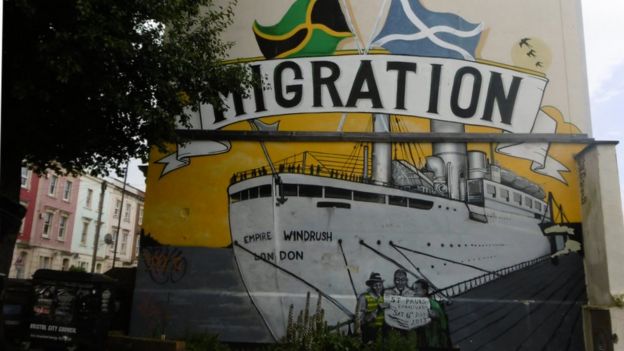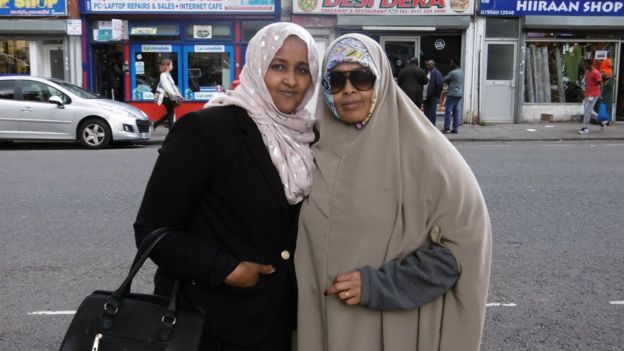
This article is more than
9 year oldFor months now, the question of whether the United Kingdom should leave the EU or remain could not be avoided, stoking fierce arguments between rich and poor, parents and children, old and young - and the African migrants eligible to cast a vote.
Noises were made about what a Leave vote would mean for Africa's meagre trade deals with the EU, and whether life after Brexit would be vastly different to life before Brexit for Africa and her citizens.
Trade, African economists argued, would change little but the duplication of aid packages from the EU and the UK would most likely increase as the UK sought to revive Commonwealth ties.

Over in Johannesburg, people wondered why the local currency, the rand, kept falling against the British pound with all the financial uncertainty hanging like a mist over London's Square Mile; and in Kigali, money-transfer companies ceased trading in sterling for 24 hours so they could gauge the anticipated slide.
Even as the dust settled last Friday morning on the UK's momentous decision to leave the EU, it was the voting intentions of Africans in Britain that made for fascinating reading.
Some of them had argued to leave, and social media had been awash with the African Brexiteers' pleas for the severing of ties with Europe, including WhatsApp circulars setting out the reasons.
London has been home to Africans since long before William Shakespeare wrote Othello.
Later, Africans settled in the capital during the height of the British Empire and at its end, contributing hugely to the city's multicultural heartbeat.
According to the 2011 census, about 1.8% of the population of England and Wales identified as black African.
Farai Sevenzo
 Image copyrightFARAI SEVENZO
Image copyrightFARAI SEVENZO"The African migrant who voted to leave was as fearful of the new arrivals, of his or her chances in a crowded job and housing market, as was his indigenous British neighbour"
In comparison with the rest of the EU, Africans have long valued the opportunities available to them in the UK and the protection the law accords them.
Despite many problems, a Race Relations Act of 1976 has tried to give them shade from the glaring heat of prejudice; they have educated their children, opened up places to worship, bought property and settled.
They have generally felt safer over the years in the UK than in the other 27 EU countries.
Better the devil you know, the pro-Brexit Africans said, arguing that the rest of Europe is notorious for its absence of colour in public office and cultural life - despite the many stars of African origin currently featuring in France's European football bonanza - and its marginalisation of generations of African migrants in forgotten high-rise estates.
In any case, their argument went, the expansion of the EU had drastically reduced the job chances of Africans from the Commonwealth and beyond.

Employers did not worry about visas for EU citizens, and a huge pool of labour with freedom of movement had simply locked out non-EU citizens from the skilled as well as the unskilled job market.
Even the NHS and care sector, which had relied so much on African professionals, began to forget them in favour of the new EU arrivals.
It was also feared that with Albania, Turkey, Serbia, Macedonia and Montenegro waiting to join the EU, the African worker could tumble to the bottom of the working pile.
And this argument was put across persistently.
The referendum debate could not escape the thorny issue of immigration, and the African migrant who voted to leave was as fearful of the new arrivals, of his or her chances in a crowded job and housing market, as was his indigenous British neighbour.
Senior politicians said during the debates that their constituents in London were bemoaning the lack of places for their children in local schools because of the burgeoning numbers coming from Eastern Europe, and such complaints were, in the case of Streatham in south London, also coming from the African-Caribbean community.
Yet the Africans awoke to a post-Brexit Britain that was as full of prejudice to the non-EU citizen as to the EU citizen.
Bitter graffiti appeared urging all foreigners to leave.
More on Brexit and Africa

People were targeted on the streets because they were black, brown, wore a turban or had an accent.
One tweet, mentioned in parliament, read: "Go home. #WevotedLeave. Time to make Britain great again by getting rid of you blacks, Asians and immigrants."

Prejudice, it seems, has been released through the pressure valve of the referendum and the pro-Brexit voters did not count on that.
And now there are more questions than answers as people wonder what will replace the EU as a trading and development partner.
The Commonwealth lost its economic clout with the end of colonies. And China is decades ahead of the old colonial rulers in terms of influence on the African continent.
Then there is a possible indicator of what the future may hold: Europe's opposition parties in France, Holland and Austria have lurched dangerously to the right, and the UK may not have escaped that trend.
The African Brexiteers may find that life after Brexit may be little different to life before the referendum, except for the nagging uncertainty.